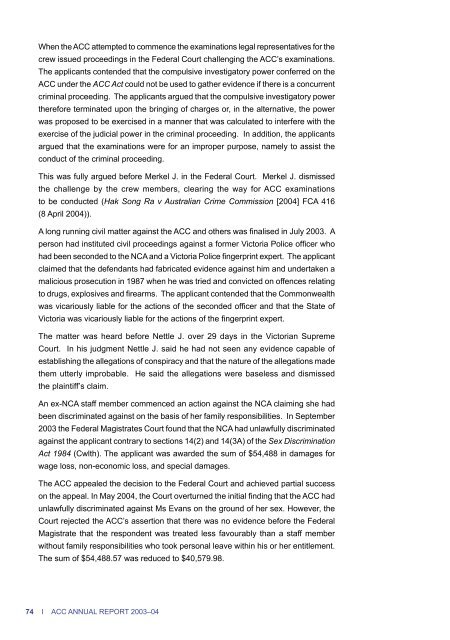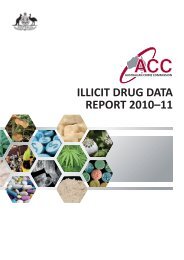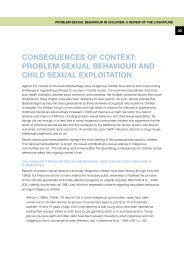Annual Report - COMPLETE - Australian Crime Commission
Annual Report - COMPLETE - Australian Crime Commission
Annual Report - COMPLETE - Australian Crime Commission
You also want an ePaper? Increase the reach of your titles
YUMPU automatically turns print PDFs into web optimized ePapers that Google loves.
When the ACC attempted to commence the examinations legal representatives for the<br />
crew issued proceedings in the Federal Court challenging the ACC’s examinations.<br />
The applicants contended that the compulsive investigatory power conferred on the<br />
ACC under the ACC Act could not be used to gather evidence if there is a concurrent<br />
criminal proceeding. The applicants argued that the compulsive investigatory power<br />
therefore terminated upon the bringing of charges or, in the alternative, the power<br />
was proposed to be exercised in a manner that was calculated to interfere with the<br />
exercise of the judicial power in the criminal proceeding. In addition, the applicants<br />
argued that the examinations were for an improper purpose, namely to assist the<br />
conduct of the criminal proceeding.<br />
This was fully argued before Merkel J. in the Federal Court. Merkel J. dismissed<br />
the challenge by the crew members, clearing the way for ACC examinations<br />
to be conducted (Hak Song Ra v <strong>Australian</strong> <strong>Crime</strong> <strong>Commission</strong> [2004] FCA 416<br />
(8 April 2004)).<br />
A long running civil matter against the ACC and others was finalised in July 2003. A<br />
person had instituted civil proceedings against a former Victoria Police officer who<br />
had been seconded to the NCA and a Victoria Police fingerprint expert. The applicant<br />
claimed that the defendants had fabricated evidence against him and undertaken a<br />
malicious prosecution in 1987 when he was tried and convicted on offences relating<br />
to drugs, explosives and firearms. The applicant contended that the Commonwealth<br />
was vicariously liable for the actions of the seconded officer and that the State of<br />
Victoria was vicariously liable for the actions of the fingerprint expert.<br />
The matter was heard before Nettle J. over 29 days in the Victorian Supreme<br />
Court. In his judgment Nettle J. said he had not seen any evidence capable of<br />
establishing the allegations of conspiracy and that the nature of the allegations made<br />
them utterly improbable. He said the allegations were baseless and dismissed<br />
the plaintiff’s claim.<br />
An ex-NCA staff member commenced an action against the NCA claiming she had<br />
been discriminated against on the basis of her family responsibilities. In September<br />
2003 the Federal Magistrates Court found that the NCA had unlawfully discriminated<br />
against the applicant contrary to sections 14(2) and 14(3A) of the Sex Discrimination<br />
Act 1984 (Cwlth). The applicant was awarded the sum of $54,488 in damages for<br />
wage loss, non-economic loss, and special damages.<br />
The ACC appealed the decision to the Federal Court and achieved partial success<br />
on the appeal. In May 2004, the Court overturned the initial finding that the ACC had<br />
unlawfully discriminated against Ms Evans on the ground of her sex. However, the<br />
Court rejected the ACC’s assertion that there was no evidence before the Federal<br />
Magistrate that the respondent was treated less favourably than a staff member<br />
without family responsibilities who took personal leave within his or her entitlement.<br />
The sum of $54,488.57 was reduced to $40,579.98.<br />
74 I ACC ANNUAL REPORT 2003–04




